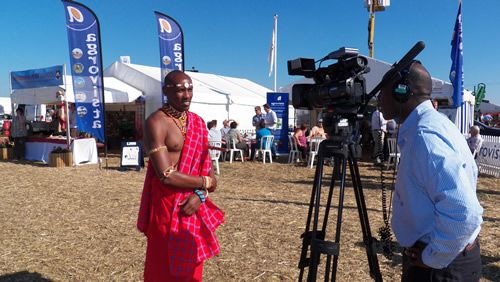
Timothy Ole Mosiany, the Kenyan student who was a guest of Agrovista UK Ltd, the leading agronomy specialist, crop protection, arable and horticultural product distributor has been reflecting on his visit.
Tim, who came over as a guest of Agrovista to study UK agriculture in September has been hard at work looking at implementing things he learnt while spending time with the companies agronomists across the UK.
He is based in the Ol Lentille reserve, Laikipia in the Northern District of Kenya. He is a 4th year student at the University of Nairobi, pursuing an undergraduate degree in environmental conservation, wildlife and range land management.
Tim has to liaise with the local community on the many different and often difficult aspects of education, water provision, healthcare, conservation and micro-enterprise development; he also helps integrate to the tourism business with the local community.
After being back in Kenya for only a matter of weeks he has already started to plan and implement changes and ideas gleaned from his visit, here he lists the first 9 areas that are already being worked on.
1. Linking environmental conservation and farming by using an integrated approach by carrying out subsistence farming of livestock to help manage the grassland and ranges.
2. Develop the skills and training to use fertilisers and agrochemicals to increase productivity of food crops on the farmlands.
3. Livestock manure can increase land productivity and crop yield when applied in sufficient amounts on the farmland.
4. Drip irrigation is highly appropriate to use to minimise water loss and use less water for higher productivity of salad and vegetable crops.
5. Joint efforts with other farming businesses can help secure better deals on items such as equipment and access to financial loans.
6. Wildlife corridors, farm hedges and woodland are highly important and should be retained on all farms in order for the birds and other animals to live in to create a balanced ecosystem.
7. A shift from cultural/traditional livestock and nomadic lifestyle is inevitable and it should be accepted without forgetting the valuable traditions for the future generations.
8. Sustainability is key to the success of every action taken in all the above for the sake of the future population
9. Water reservoirs are needed to collect rainfall through the winter months for people, livestock, farming and wildlife to use during the dry season.
Tim comments "Although agriculture here in northern Kenya is very different from what I saw when visiting the UK, it has enabled me to come back with a range of ideas, some we can implement very quickly and get an immediate return, others will take longer, such as reservoirs – but even these are being thought about and studied. We must train our people how to use technology to make the best of the farmland and therefore preserve the wildlife and natural habitats that exist here."
